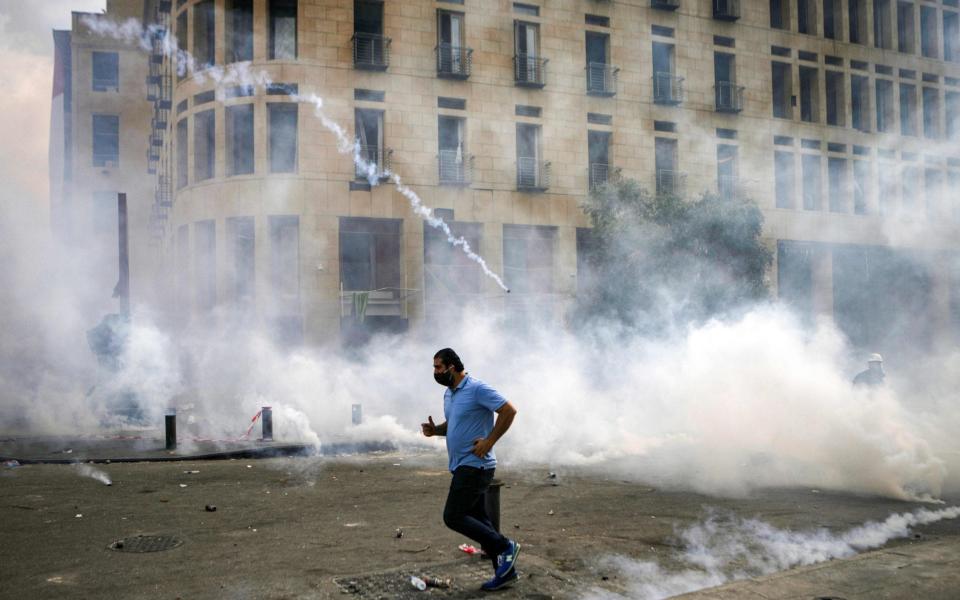Protests turns ugly in Beirut as demonstrators take aim at political elite after massive explosion

Police in Beirut fired volleys of teargas and rubber bullets on Saturday night as furious demonstrations in the aftermath of the massive explosion in the city's port that killed more than 150 turned ugly.
The Lebanese capital was teetering on the brink of fearsome violence, with some reports suggesting police had used live ammunition.
The rallies claimed a human toll too, with one policeman falling to his death following an "assault" by "rioters", the police said.
A group of around 200, including retired army officers, stormed the foreign ministry, proclaiming it to be the new headquarters of the ‘revolution’ and calling on the government to resign.
As a stampede of people sprinted away from the demonstration to regroup, one protester screamed: “They are trying to kill us.”

The occupation of the foreign ministry was disbanded after less than three hours as protesters were driven out by army personnel firing rubber bullets and tear gas.
Lebanese protesters stormed several ministries on Saturday in apparently planned raids. Separate groups of protesters also converged on the economy ministry, the Association of Banks in Lebanon and the energy ministry before being forced out by the army shortly afterwards.
Around 130 people were injured in the clashes, according to the Lebanese Red Cross.
Lebanese Prime Minister Hassan Diab said he would request early parliamentary elections to defuse an escalating political crisis.
"We cannot get out of this crisis without early parliamentary elections," he said, reading a statement. He added he was not to blame for the country's deep economic and political woes.
He added he was not to blame for the country's deep economic and political woes.
Protesters had built gallows and hung nooses around the necks of cardboard cutouts of Lebanon’s political elite ahead of Saturday's march on Martyrs' Square.
And within minutes of the start of the demonstrations, police fired teargas at several thousand peaceful protesters as they marched towards the parliament building.
Men, women and children marched through the destroyed streets of the city, brandishing sweeping brushes and a nooses as they called for the downfall of the Lebaense government.
“Resign or we hang,” read one placard.
Resident Rawan Hijazi said: “Beirut has never been this angry.”
Lebanon’s leaders have been accused of gross negligence by failing to store safely around 2,700 tonnes of ammonium nitrate in Beitut’s port before it exploded on Tuesday, unleashing a massive shockwave that wrecked nearly half the city.
According to one report, Lebanese authorities were warned 10 times over the course of six years that the stockpile was lethally dangerous, but they failed to take action.
Before sprinting away from the sound of gunfire, Rawan Hijazi, a 27-year-old activist, said: “I saw this spirit first on October 17 when the protests broke out, but it was hope. Now it’s complete anger.”
One protester said: “I know the government won’t do anything. We have a human need to help those affected. We have no trust whatsoever in the government - not even in the police, not in the army.”
Martyrs’ Square in downtown Beirut, the focal point of an anti-government movement which has lasted for nearly a year, was filled with thousands of Lebanese flags.
Young women stood on the roofs of cars that were destroyed in the blast denouncing Lebanon’s former warlords, who are now senior politicians, as ambulances rushed to take last night’s wounded to Lebanon’s already overwhelmed hospitals.
It came after people from all over the country descended on Beirut to join a mass clean-up mission in the face of state inaction. .
Even before the explosion brought Beirut to its knees, Lebanon was reeling from an economic crisis and widespread political corruption.
The tragedy has prompted several prominent MPs to resign from the Lebanese parliament.
Protestor Ghada Araji said: “The government killed our people in that explosion and they’ve killed our country over years. They still won’t resign. We’re going to make it change. The explosion was the last straw.”
